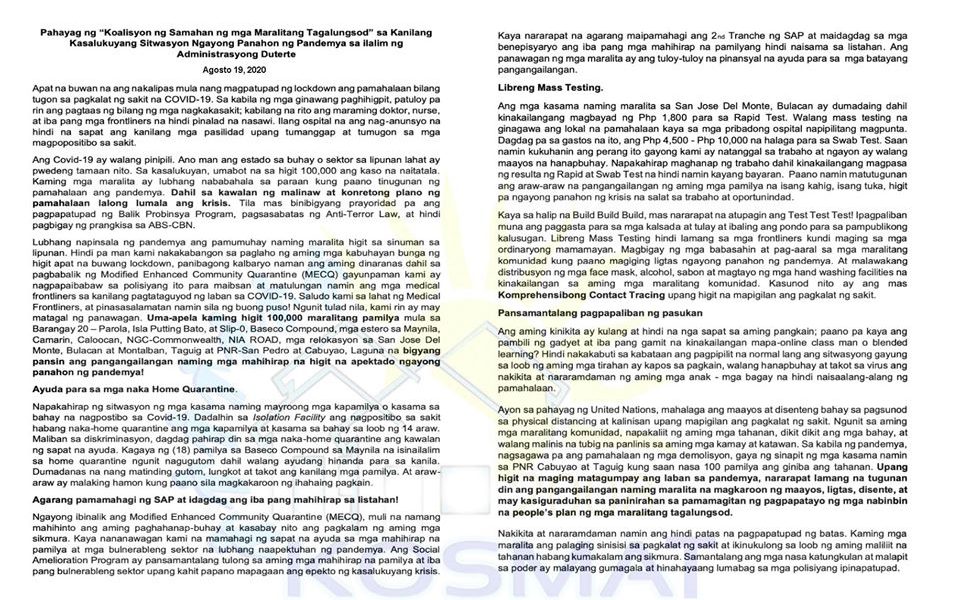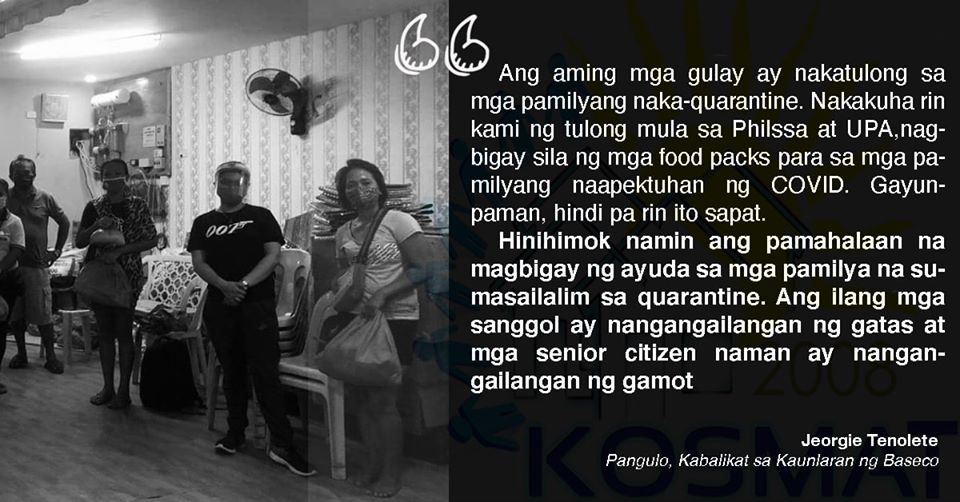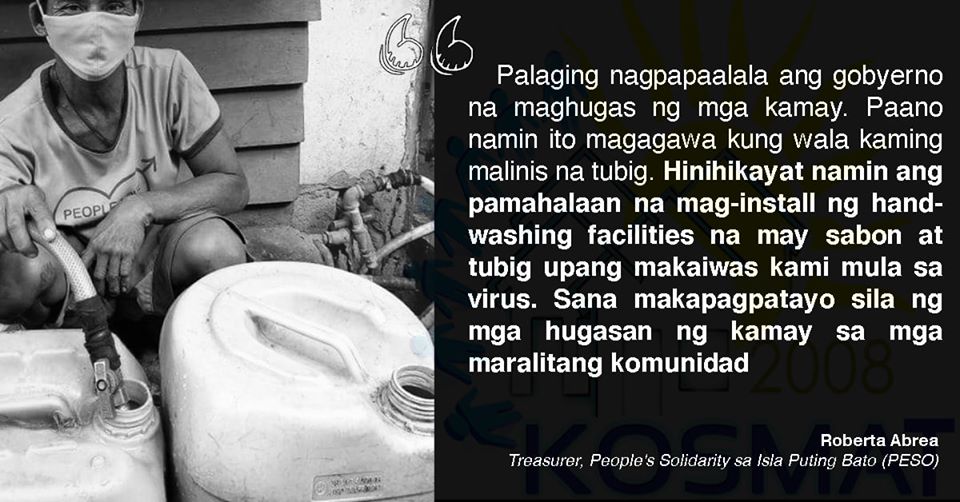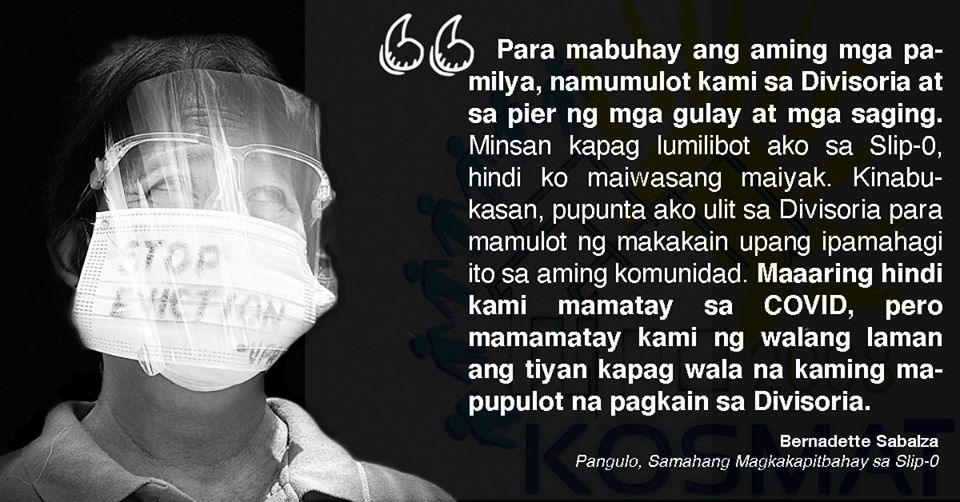Home > Blog > Covid-19
The Urban Poor Call for Urgent Measures to Help Vulnerable Populations

19 August 2020. With 17.7 million Filipinos already living in poverty [1], Koalisyon ng Samahan ng mga Maralitang Tagalungsod (KOSMAT) calls on the government for urgent measures to help vulnerable populations, especially since the country has reached 160,000 COVID-19 cases. The group claims that many of them felt poorer due to the pandemic and the lockdown’s blunt effects. This is consistent with the latest Social Weather Stations (SWS) survey that says 79 percent of adult Filipinos’ quality of life worsened and that 45.5% became jobless or nearly half of the country’s adult labor force.
Jeorgie Tenolete, President of Kabalikat ng Kaunlaran sa Baseco (Kabalikat) said, “The situation in Baseco has worsened especially for those of us who have family members that tested COVID positive. Those positive patients will be put in isolation facilities while the family members need to observe the 14-day quarantine. As of today, 18 families are subjected to a 14-day home quarantine without any aid from the government. Since they cannot go out to work, they suffer from hunger, loneliness, and fear of the repercussions of COVID.” In Baseco, strict protocols of home quarantine are observed because it has 22,000 urban poor families.

Tenolete added, “We hope that the government can assist families under home quarantine because without food, there is nothing to strengthen their immune system.” The 400 family members of Kabalikat have depended on their urban gardens which were established in 2010 to supplement their food requirements. The gardens have sustained the families during the lockdown and has helped them at this time of quarantine.
Tenolete concluded, “Our vegetables give relief to families in quarantine. Luckily, we got aid from Philssa and UPA, our partner NGOs. They provided food packs to families afflicted with COVID. However, this is still not enough. We are urging the government to provide support to the families under quarantine. Some babies especially need milk and senior citizens need medication.”
Meanwhile in Isla Puting Bato, Roberta Abrea, Treasurer of People’s Solidarity in Isla Puting Bato (PESO) said, “Many of us lost our jobs because of the “no work, no pay” policy. Before we could eat meat in a day. But now we barely survive with anything that we can afford to buy since the lockdown. Food became expensive compared to before the pandemic. Food is not our only problem here in Isla. Many of our neighbors suffer from lack of water and electricity disconnection. Our ‘patubig’ (organization’s communal faucet) bill went up because many of the residents asked us if they can continue receiving water to be paid when they get their jobs back. But how can they pay? They are not even sure if they still have work to go back to. So our organization is shouldering the cost. We don’t know how long we can manage to pay our ‘patubig.’
Abrea added, “Water is very essential. The government always reminds us to wash our hands. How can we do that if we have no access to clean water. We are calling on the government to help poor communities like Isla to provide us with clean supply of water. We urge the government to install handwashing facilities with soap and water to make our community resilient from the virus. We hope they could build basic handwashing stations in slum communities.”

Bernadette Sabalza, President of Samahang Magkakapitbahay sa Slip-0 said, “Even if we are called “maralita” (poor), we don’t want to depend on the government for our daily needs. However, this pandemic and lockdown have brought us deeper suffering and hopelessness. For our families to survive, we go to Divisoria and the pier to pick up or scavenge for vegetables and bananas that are not sold. We never experienced this before lockdown. Sometimes when I go around the community, I cannot help but cry. The next morning, I would go again to Divisoria to pick up any food that I can get, to share with the community. That is all we can do to survive. We might not die of COVID, but we will die from an empty stomach when there is no more food to scavenge.”

Marilou Aquino, Camarin Balikatan Community Association (CBACAI) Secretary said, “We are urging the government to release the second tranche of the Social Amelioration Program (SAP). We have been waiting for it since June, but until now there is still no SAP. We urge the government to distribute the second tranche. It can help alleviate the sufferings and anxiety that we are experiencing in the community.”
Alice Murphy, Urban Poor Associates (UPA) Executive Director said, “I hope the government will listen to poor families who are the hardest hit from the pandemic. These communities are doing what they can to help promote awareness on COVID, provide masks, food for families under quarantine, and provide water for their communities. But they can only do so much. The government must first impose a moratorium on evictions and demolitions, and allocate resources for the following: extension of the SAP until the end of the lockdown, assistance for poor families under quarantine and increase long-term resilience of poor communities to COVID by ensuring access to clean water, building handwashing facilities, improving housing conditions thru slum upgrading and site development, and capacitating urban poor groups of infection and prevention control.”
For inquiries and donations, send your message to:
Urban Poor Associates
112-B Matahimik Street, Brgy.UP Village, Q.C. Telefax: 4264118 Tel.: 4264119 / 4267615
Ref: Princess Asuncion-Esponilla
Mobile phone: 0908.8963589 www.urbanpoorassociates.org
[1] Philippine Statistics Authority (2020, June 4). Updated 2015 and 2018 Full Year Official poverty statistics. https://psa.gov.ph/content/updated-2015-and-2018-full-year-official-poverty-statistics (Accessed August 14, 2020)

